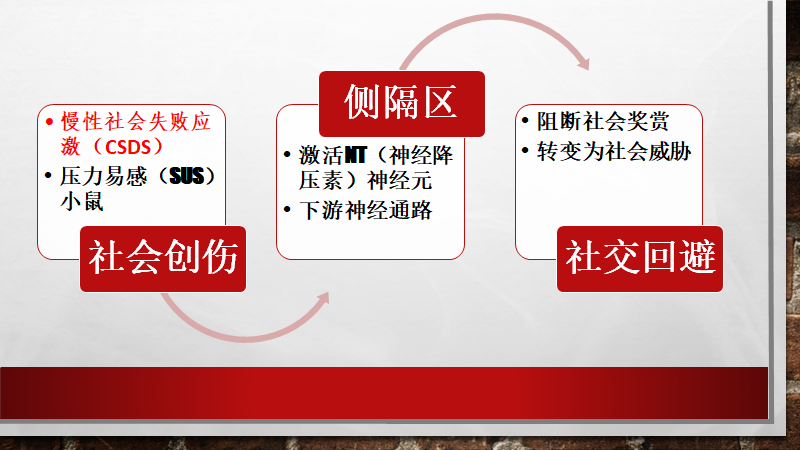Nature—神经社会学研究重磅突破:侧隔区神经降压素神经元调控社交逃避和社会奖赏行为
2022-12-06 神经科学临床和基础 神经科学临床和基础 发表于安徽省
创伤性的社会经历会导致精神疾病。有人认为,社会创伤会损害大脑的奖赏功能,从而使社会行为不再产生奖赏,从而导致严重的社会逃避行为。

 中文摘要
中文摘要
在人类中,创伤性的社会经历会导致精神疾病。有人认为,社会创伤会损害大脑的奖赏功能,从而使社会行为不再产生奖赏,从而导致严重的社会逃避行为。在啮齿类动物中,慢性社会失败应激(CSDS)模型已被用于理解社会创伤后应激易感性与恢复力之间的神经生物学基础,但对其对社会奖赏的影响知之甚少。在这里,科学家发现,在CSDS后,一组被称为创伤易感(SUS)的雄性和雌性小鼠避免与非攻击性、同性幼年C57BL/6J小鼠接触,并且在与它们相遇后不会产生依赖于环境的社会奖励。非社会压力源对两性的社会奖励都没有影响。接下来,使用全脑Fos图谱、体内Ca2+成像和全细胞记录,科学家鉴定了一组应激/威胁反应性侧隔区神经降压素(NTLS)神经元,这些神经元仅在SUS小鼠中由幼年期社会互动种激活,而在有压力抵抗或无压力的对照小鼠中无激活。NTLS神经元及其下游连接的光遗传学或化学遗传学操纵调节社会互动和社会奖励。总之,这些数据表明,在SUS小鼠中,先前奖励的社会目标可能被视为社会威胁,这是由于过度活跃的NTLS神经元阻断了社会奖励所致。
英文摘要
In humans, traumatic social experiences can contribute to psychiatric disorders1. It is suggested that social trauma impairs brain reward function such that social behaviour is no longer rewarding, leading to severe social avoidance2,3. In rodents, the chronic social defeat stress (CSDS) model has been used to understand the neurobiology underlying stress susceptibility versus resilience following social trauma, yet little is known regarding its impact on social reward4,5. Here we show that, following CSDS, a subset of male and female mice, termed susceptible (SUS), avoid social interaction with non-aggressive, same-sex juvenile C57BL/6J mice and do not develop context-dependent social reward following encounters with them. Non-social stressors have no effect on social reward in either sex. Next, using whole-brain Fos mapping, in vivo Ca2+ imaging and whole-cell recordings, we identified a population of stress/threat-responsive lateral septum neurotensin (NTLS) neurons that are activated by juvenile social interactions only in SUS mice, but not in resilient or unstressed control mice. Optogenetic or chemogenetic manipulation of NTLS neurons and their downstream connections modulates social interaction and social reward. Together, these data suggest that previously rewarding social targets are possibly perceived as social threats in SUS mice, resulting from hyperactive NTLS neurons that occlude social reward processing.
本网站所有内容来源注明为“梅斯医学”或“MedSci原创”的文字、图片和音视频资料,版权均属于梅斯医学所有。非经授权,任何媒体、网站或个人不得转载,授权转载时须注明来源为“梅斯医学”。其它来源的文章系转载文章,或“梅斯号”自媒体发布的文章,仅系出于传递更多信息之目的,本站仅负责审核内容合规,其内容不代表本站立场,本站不负责内容的准确性和版权。如果存在侵权、或不希望被转载的媒体或个人可与我们联系,我们将立即进行删除处理。
在此留言






